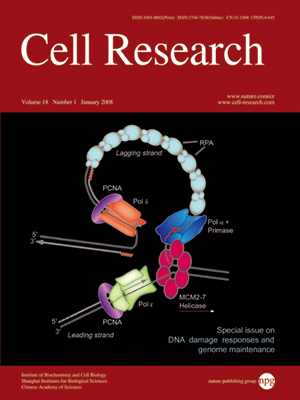
Volume 18, No 1, Jan 2008
ISSN: 1001-0602
EISSN: 1748-7838 2018
impact factor 17.848*
(Clarivate Analytics, 2019)
Volume 18 Issue 1, January 2008: 99-113
REVIEWS
Homologous recombination in DNA repair and DNA damage tolerance
Xuan Li1 and Wolf-Dietrich Heyer1,2
1Section of Microbiology University of California, Davis, Davis CA 95616-8665, USA
2Section of Molecular and Cellular Biology, University of California, Davis, Davis CA 95616-8665, USA
Correspondence: Wolf-Dietrich Heyer(wdheyer@ucdavis.edu )
Homologous recombination (HR) comprises a series of interrelated pathways that function in the repair of DNA double-stranded breaks (DSBs) and interstrand crosslinks (ICLs). In addition, recombination provides critical support for DNA replication in the recovery of stalled or broken replication forks, contributing to tolerance of DNA damage. A central core of proteins, most critically the RecA homolog Rad51, catalyzes the key reactions that typify HR: homology search and DNA strand invasion. The diverse functions of recombination are reflected in the need for context-specific factors that perform supplemental functions in conjunction with the core proteins. The inability to properly repair complex DNA damage and resolve DNA replication stress leads to genomic instability and contributes to cancer etiology. Mutations in the BRCA2 recombination gene cause predisposition to breast and ovarian cancer as well as Fanconi anemia, a cancer predisposition syndrome characterized by a defect in the repair of DNA interstrand crosslinks. The cellular functions of recombination are also germane to DNA-based treatment modalities of cancer, which target replicating cells by the direct or indirect induction of DNA lesions that are substrates for recombination pathways. This review focuses on mechanistic aspects of HR relating to DSB and ICL repair as well as replication fork support
Cell Research (2008) 18:99-113. doi: 10.1038/cr.2008.1; published online 1 January 2008
FULL TEXT | PDF
Browse 1964


